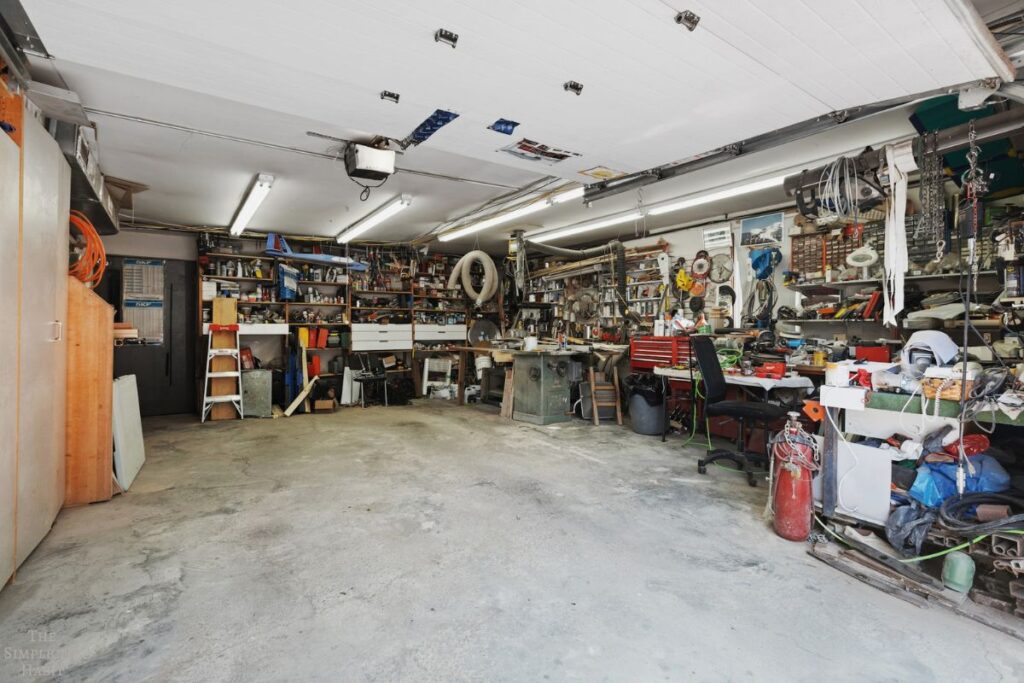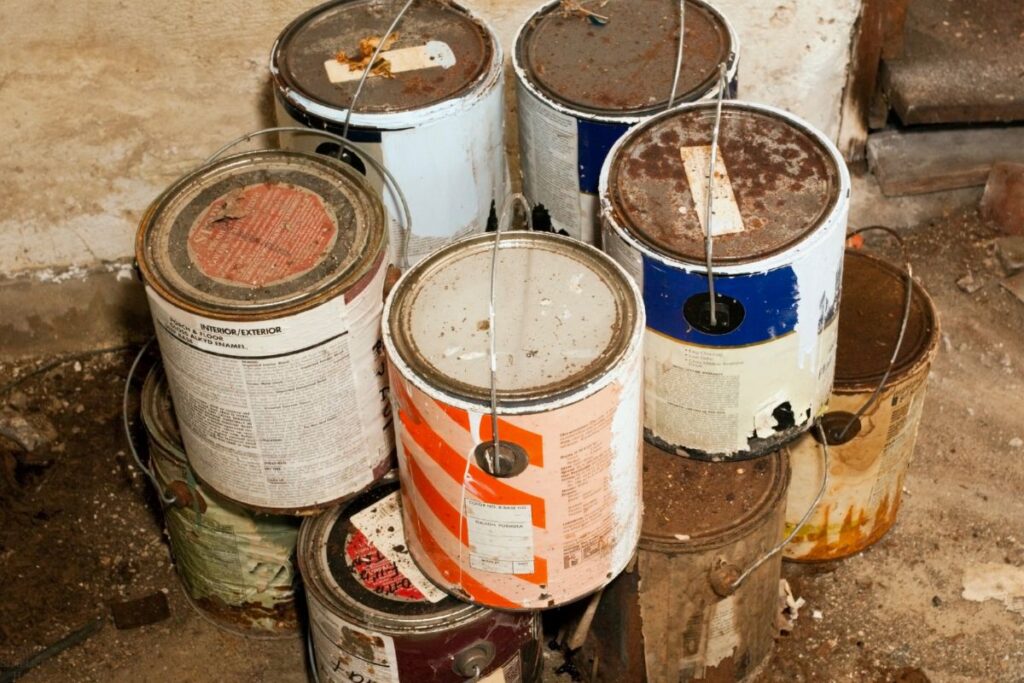Inside: If you have these expired items in your home, go ahead and toss them to clear up additional space.
A guest post by Cora Gold
If you’re like many people, your space is a treasure trove of stuff. It accumulates over the years and not only can it become a burden and a stress, but it may also create other ill effects in your home.
Unfortunately, some items can harm you and your family’s health, so it’s good to do a clean sweep and declutter expired items from your home.
It’s easy to forget about some of these items or perhaps avoid getting rid of them because you know they require special handling.
But getting items out of your home that could harm your health will not only set your mind at ease but will also free up additional space in your home.
Read on for guidelines to consider and helpful tips on how to properly dispose of these expired items that may be lurking in your home.

Expired Items in Your Home That Need Special Handling
When you’re removing unwanted items from your home it’s important to donate responsibly. With expired items, this can be a bit more challenging, but not impossible.
You can’t simply toss everything expired into the trash. Some items require special handling, but where do you get rid of them?
To discover disposal instructions, search for the item in the Earth 911 database or contact your local environmental health or solid waste management entity.
Here are some expired items in the home that require special handling.
1. Household Chemicals
Household cleaners like bleach can degrade over time, becoming less effective. For example, bleach deteriorates at a rate of 20% per year, eventually breaking down into a simple salt and water solution that produces no chlorine fumes.
If your local service doesn’t offer routine removal of such products, check for special waste collection days. They might also have a directory of local businesses that dispose of such items.

2. Garage Chemicals
Garage chemicals require the same disposal as household ones. It applies to substances such as:
- Motor oil
- Premixed engine coolant
- Herbicides
- Pesticides
3. Fireworks
If you have some old fireworks lying around, their disposal requires special handling. Fortunately, proper storage can extend their life, but check the expiration date, and dispose of any showing signs of damage or discoloration.
To dispose of fireworks safely, begin by soaking them in water until thoroughly saturated. Wrap them quickly in plastic to prevent them from drying before dropping them off at your nearest waste disposal site.
4. Fire Extinguishers
Hopefully, you have a fire extinguisher if you regularly set off fireworks. Most of these last approximately ten years. Dispose of any that:
- Are greater than 10 years old.
- Have a pressure gauge showing red or yellow.
- Show outer damage, such as a cracked nozzle or handle.
- Are used.
You can take these to the same hazardous household waste disposal facility where you drop off your other expired goods or contact your local fire department for advice.

5. Paint
Some jurisdictions allow you to trash old paint once it has fully hardened but check with your waste disposal facility to be sure. However, paint recycling is an even more eco-friendly option.
Check with your local recycling center to see if they offer such services.
6. Batteries
Most jurisdictions allow you to put alkaline and zinc carbon batteries in your trash bin, but doing so isn’t very eco-friendly. Your better bet is to check with your local sorting center to see if they will recycle them.
Keep old 9-volt batteries separate before recycling, covering the posts with duct or electrical tape. Otherwise, they can start a fire if they come into contact with metal or another battery’s post.
7. Smoke and Carbon Monoxide Detectors
Did you know smoke and carbon monoxide detectors have an expiration date? Toss yours once they’re past their prime. Those without expiration dates are too old to operate, so swap them out, too.
Here, the danger isn’t from disposal but the potential harm your family faces without a warning system.

Expired Items in Your Home That Could Endanger Your Health
You probably know moldy food doesn’t do you any favors, but is it safe to take expired medication? What about sunscreen that’s well past its expiration date? And how long should you keep different types of makeup? Knowing the answers can protect you and your loved ones.
Some items don’t require a trip to a hazardous waste disposal site. However, they pose risks to your family’s health all the same.
Check the following items to see if they’re past their active lifespan.
1. Medicines
So how do you properly dispose of expired medications? According to the FDA, the best option is to participate in a drug takeback program.
If that is not available in your area or for the medication you have, check these guidelines for how to dispose of medications at home. Take proper precautions as needed depending on the drug.
Wondering if your over-the-counter medications are still safe to take after their expiration date? The answer is likely yes, but make sure to look up the specific medication and consult your physician if you’re unsure.
2. Sunscreen
Expired sunscreen can leave you with angry red skin or even blisters. The FDA requires these to remain good for at least three years — dispose of them after that.
If you’re unsure, search for an expiration date. If you’re still uncertain, tossing the container and buying a new tube is best.
An ineffective sunscreen can leave you with a bad burn so it’s not worth the risk.

3. Bug Spray
A few itchy bites may seem like no big deal unless you’re traveling where the Zika, West Nile, dengue, malaria, or Chikungunya viruses proliferate. Then they can spell big trouble for you and your family.
How long bug sprays last depends on their active ingredient:
- DEET or picaridin: 3 years
- IR3535: 2 years
- Herbal or natural ingredients: 1 year
While buying new bug spray can feel frustrating, it’s better than getting a lot of bites after using an ineffective spray.
4. Shoes
Shoes might not seem like a health hazard until you find yourself in an orthopedic office with a wicked case of patellar tendonitis or plantar fasciitis. If you’re still running in sneakers that aren’t in good shape, it’s best to go ahead and replace them before you end up with an injury.
You should swap out your running or exercise shoes every 500 miles. This rule also applies to footwear like workboots that protect you on the job.

5. Makeup
That mascara is only good for three to six months, even if you rock a natural look most days. Bacteria can get in the tube and take over other makeup brushes.
Eye makeup is perhaps most insidious because it can cause infections, although germy buildup on your foundation sponge can lead to more acne breakouts.
Go ahead and declutter the makeup that you never use anymore. You’ll free up space and make it easier to access what you’re actually using.
6. Hand Sanitizer
Health experts recommend using a hand sanitizer containing at least 60% alcohol — the higher the percentage, the greater the germ-killing power. However, this active ingredient breaks down relatively rapidly when exposed to air.
Replace it every two to three years if you haven’t gone through it by then.
7. Car Seats
If you’re in a car accident, the car seats need to be replaced immediately. Aside from that, car seats have a useful life of about 6 to 10 years, depending on how much your children use them as well as where you live.
Prolonged sun exposure weakens plastic — so they’ll last longer on average in Minneapolis, MN, than they will in Phoenix, AZ.
Target recycles expired car seats and hosts an event twice per year where you can trade in your car set for a coupon to receive a discount on a new one.

8. Food
Food may have been the first thing you thought of when it comes to expired items. If you’ve ever eaten food that went bad and suffered the uncomfortable consequences, you know that it’s important to keep an eye on the quality of your food.
Take the time to declutter your pantry. Check the expiration dates and toss anything that is too far past its date.
That doesn’t mean you need to throw out everything right after it ‘expires’. Use this guide to help you determine what needs to go.
Next, tackle your fridge and get rid of anything that smells funky, looks bad, or that you know you no longer would (or should) eat.
Going forward you can reduce food waste by not overbuying on groceries. Once you have a good handle on your family’s eating habits you can prevent impulse and aspirational buys that later end up getting tossed in the trash.

Other Expired Items In Your Home to Declutter
While looking for expired items in your home to declutter, don’t overlook the little things, like shampoo, conditioner, lotion, and deodorant.
Although these substances don’t pose health risks, time can alter their chemical composition, making them smell and appear different from when you first bought them. If they don’t seem right or you’re just not using them, toss them in the bin.
Declutter These Expired Items from Your Home
Expired items can pose risks to you and your family’s health. Some require special waste management to dispose of, while others can be safely tossed in the trash.
Declutter your home by inspecting it for these often overlooked items and disposing of them properly. You’ll enjoy a tidier, healthier abode for your efforts.

Cora Gold is the Editor-in-Chief of Revivalist magazine. She loves writing about family and living life to the fullest. Follow Cora on Twitter, Facebook and Pinterest.
Want more decluttering tips?
Sign up on the form below to get weekly decluttering tips and inspiration sent straight to your inbox. You’ll also get the free 5 Areas to Declutter in 10 Minutes Checklist to help you get started decluttering today.

